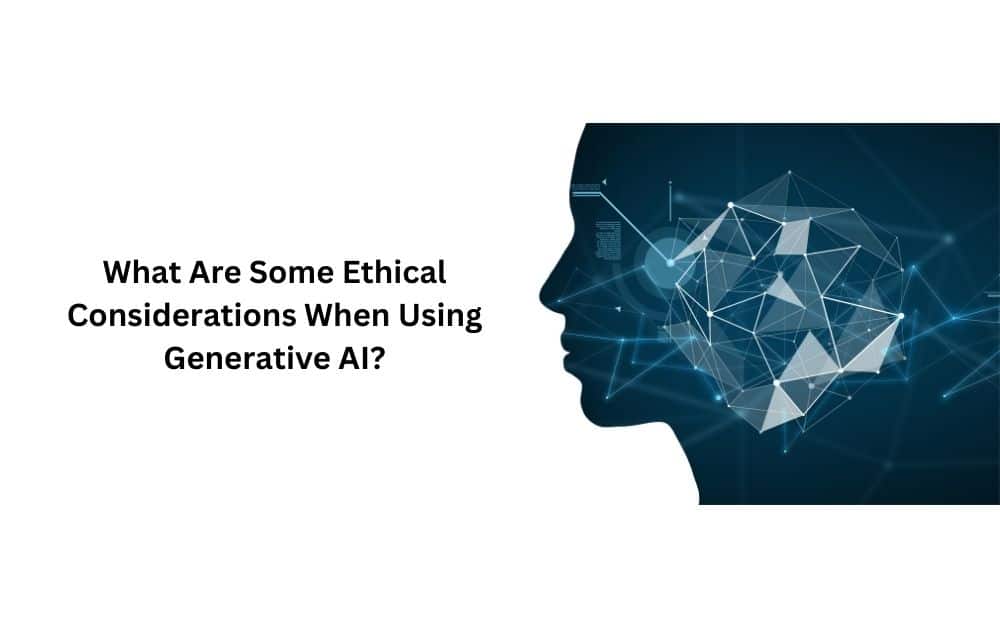Generative AI is a smart technology that can create new things like pictures, stories, and even music by learning from examples. It’s used in many areas, from making fun games to helping scientists discover new medicines. But as powerful as it is, we must be careful about how we use it.
So, what are some important things to think about when using generative AI? We need to ensure it’s used fairly, safely, and without harming others.
In this blog, we’ll explore the ethical considerations of generative AI and learn how to use this amazing technology responsibly.
Table of Contents
What Is Generative AI?

Before we dive into the ethical considerations, let’s understand what generative AI is. Generative AI is a type of artificial intelligence that can create new content. This content can be anything from a new picture of a cat to a story about space adventures. It learns from lots of examples and then makes something new based on what it has learned.
How Does Generative AI Work?
Generative AI works by studying patterns. For example, if you show it thousands of pictures of cats, it will learn what makes a cat picture and then create its own. The more examples it sees, the better it becomes at making new content. This process is like how people learn. For instance, when you practice drawing, your drawings get better and better.
Statistics Related to Generative Artificial Intelligence
Generative AI is rapidly advancing, with global market size projected to grow from $10.7 billion in 2022 to $53.9 billion by 2028, at a CAGR of 31.4%. It plays a key role in various industries, with AI-generated content expected to make up 90% of digital content by 2025.
Additionally, companies using generative AI can achieve up to a 50% reduction in time-to-market for new products. However, 60% of AI experts express concerns about ethical implications, emphasizing the need for responsible use and regulation. These statistics highlight both the immense potential and the challenges of generative AI.
Why Is Ethics Important in Generative AI?
Generative AI is powerful, but with great power comes great responsibility. If we’re not careful, AI could be used in ways that might hurt people or cause problems. This is why it’s important to think about ethics when using generative AI.
Protecting People’s Privacy
One of the biggest concerns with generative AI is privacy. Privacy means keeping information about people safe. Sometimes, AI can create something using personal data, like pictures or messages, without permission. This can be a problem because everyone has the right to keep their personal information private.
Example: Imagine if someone used your photos to create something without asking you. You might feel uncomfortable or even upset. That’s why it’s important for people using AI to make sure they have permission before using personal information.
Avoiding Bias
Another important ethical consideration is avoiding bias. Bias means treating someone unfairly because of who they are. For example, if an AI only learns from pictures of one type of person, it might not work well for everyone. This is called bias, and it can be a big problem.
Example: If an AI is trained only on pictures of men, it might not recognize women as well. This isn’t fair and can lead to problems, especially if the AI is used in important areas like job applications or medical treatments.
Ensuring Fair Use
Fair use means using something in a way that is fair and doesn’t harm others. When it comes to generative AI, this means making sure that what the AI creates is used in a way that is good for everyone.
Example: If an AI creates a new song, it’s important to make sure that the original artists or creators are given credit. This is only fair since they helped make the new creation possible.
Preventing Harmful Uses
Generative AI can be used to create amazing things, but it can also be used to create harmful things, like fake news or images that aren’t real but look like they are. This can be very dangerous because it can trick people or spread false information.
Example: If someone uses AI to create a fake video of someone saying something they never said, it could cause big problems. People might believe the video is real, which could lead to misunderstandings or even hurt someone’s reputation.
Related Ethical Issues in Technology
Apart from generative AI, there are other areas in technology where ethics play a big role. Let’s look at two more related ethical issues.
Data Security
Data security is all about keeping information safe from hackers or people who want to use it in the wrong way. With so much of our lives online, it’s important to make sure that our data, like passwords and personal details, is protected.
Example: If a hacker steals your password, they could get into your accounts and cause trouble. That’s why companies work hard to protect your data with strong security measures.
Cyberbullying
Cyberbullying is when someone uses the internet to bully or hurt others. This is a big ethical issue because it can cause real harm to people, especially kids and teens.
Example: If someone sends mean messages online or spreads lies about someone, it can make the victim feel very sad or scared. It’s important to treat everyone with kindness, both online and in real life.
How Can We Use Generative AI Responsibly?
Now that we know about the ethical issues, let’s talk about how we can use generative AI in a responsible way. Here are some tips:
Ask for Permission
Before using any personal information, always ask for permission. This shows respect for other people’s privacy.
Be Aware of Bias
When creating or using AI, make sure it’s trained on a diverse set of examples. This helps the AI work well for everyone, not just a specific group of people.
Credit the Original Creators
If AI helps create something new, give credit to the original creators. This is fair and encourages creativity.
Think About the Consequences
Before using AI to create something, think about how it might affect others. Will it help or hurt people? Make sure your actions are positive.
The Future of Generative AI and Ethics
Generative AI is still a new technology, and we are learning more about it every day. As it continues to grow, it’s important that we keep thinking about the ethical issues. By doing so, we can make sure that AI is used in a way that is good for everyone.
Education and Awareness
One of the best ways to ensure ethical use of AI is through education. By teaching people, especially young ones, about AI and ethics, we can help them make smart decisions in the future.
Working Together
It’s also important for everyone—scientists, teachers, and even kids—to work together to solve these ethical issues. By sharing ideas and coming up with solutions, we can make sure AI is used in a way that benefits everyone.
Conclusion
Generative AI is an amazing tool that can do incredible things. But with its power comes the responsibility to use it ethically. By protecting privacy, avoiding bias, ensuring fair use, and preventing harmful uses, we can make sure that generative AI is a force for good in the world.
It’s also important to remember that ethical considerations aren’t just for AI. They apply to all areas of technology, like data security and cyberbullying. By being aware of these issues and thinking about how our actions affect others, we can help create a better, fairer world for everyone.
Let’s work together to make sure that as AI and technology grow, they are used in ways that make the world a better place!


